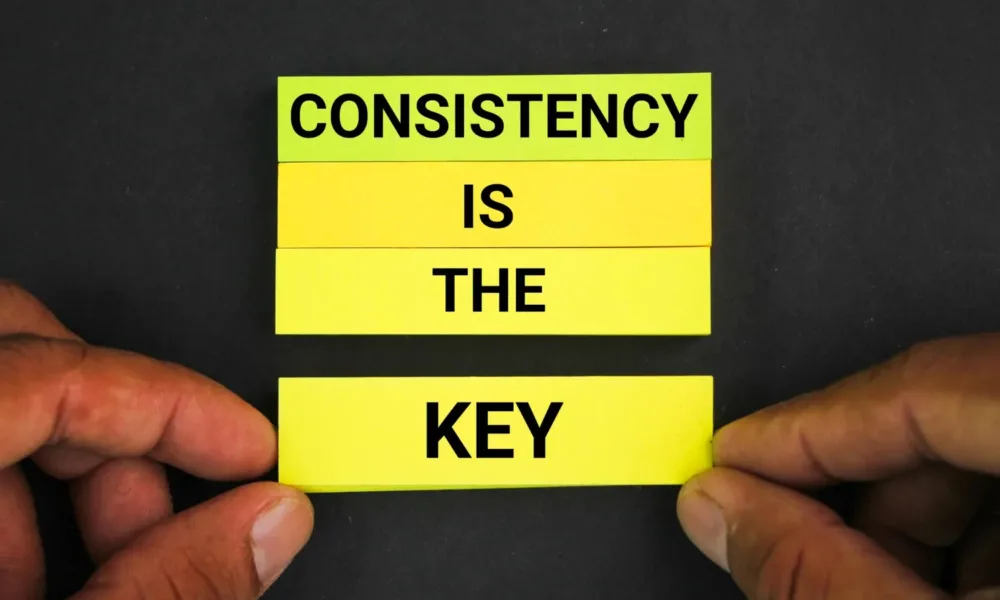How to Build Consistency When Motivation Fades
We’ve all been there. You start a new habit or project with unstoppable enthusiasm. You feel unstoppable—waking up early, hitting the gym, eating healthy meals, writing in your journal, or learning a new skill.
We’ve all been there. You start a new habit or project with unstoppable enthusiasm. You feel unstoppable—waking up early, hitting the gym, eating healthy meals, writing in your journal, or learning a new skill. For a while, it feels exciting, fresh, and manageable. Then, somewhere along the way, the spark fades. The gym sessions feel like a chore, the new habit starts to slip, and you wonder: Where did my motivation go?
The truth is motivation is fleeting. It comes and goes, often influenced by mood, environment, and circumstances. Relying solely on motivation to drive your actions is like depending on the weather—it’s unpredictable. Consistency, however, is what truly delivers results. It’s consistency that gets the book written, the marathon completed, the business built, or the healthy lifestyle sustained.
The challenge lies in this: how do you stay consistent when your motivation fades? This article will dive into practical strategies, psychological insights, and actionable steps to help you show up even on days when you don’t feel like it.
Table of contents
- Why Motivation Fades
- Consistency vs. Motivation
- The Psychology of Consistency
- Strategies to Build Consistency When Motivation Fades
- 1. Start Small and Simple
- 2. Build Systems, Not Just Goals
- 3. Create Rituals and Triggers
- 4. Embrace Identity-Based Habits
- 5. Use Accountability and Support
- 6. Plan for Obstacles
- 7. Celebrate Small Wins
- 8. Design Your Environment for Success
- 9. Track Your Progress
- 10. Detach Emotion from Action
- 11. Use the Power of “Minimum Viable Effort”
- 12. Connect Habits to Your “Why”
- Real-Life Examples of Consistency Over Motivation
- The Emotional Side of Consistency
- Long-Term Benefits of Consistency
- Conclusion: The Quiet Power of Consistency
Why Motivation Fades
Before we talk about building consistency, let’s understand why motivation doesn’t last forever.
- The Novelty Wears Off
New habits feel exciting in the beginning because the brain loves novelty. But once the routine becomes familiar, the dopamine rush declines. - Unrealistic Expectations
Many people start with goals that are too big—expecting rapid progress. When results take time, motivation dwindles. - Decision Fatigue
Constantly forcing yourself to “choose” the habit drains mental energy. Eventually, willpower weakens. - Life Gets in the Way
Stress, responsibilities, and unexpected challenges often pull us away from new routines.
Understanding these factors helps you prepare for the natural dip in motivation and focus instead on systems that keep you going.
Consistency vs. Motivation
Motivation is the spark. Consistency is the fire that keeps burning. Think of it this way:
- Motivation: Emotional energy that drives you to start.
- Consistency: Discipline and systems that keep you going.
Successful people don’t have more motivation than others; they’ve learned to rely on habits, routines, and environments that make consistency possible.
The Psychology of Consistency
Several psychological principles explain why consistency is so powerful:
- Habit Loop (Cue → Routine → Reward): By creating triggers for your desired behavior, you reduce reliance on motivation.
- Commitment Bias: Once you identify as someone who does the habit (e.g., “I’m a runner”), you’re more likely to follow through.
- Small Wins: Each consistent action builds confidence, reinforcing the habit.
- Momentum Effect: Once you start, it’s easier to keep going—consistency creates its own motivation.
Strategies to Build Consistency When Motivation Fades
Here are proven, practical strategies to keep you on track.
1. Start Small and Simple
One of the biggest reasons people quit is starting too big. Instead of committing to an hour-long workout every day, start with 10 minutes. Instead of journaling three pages, start with three sentences.
Consistency thrives on simplicity. When the barrier is low, it’s easier to stick with the habit even on low-energy days.
Tip: Follow the Two-Minute Rule: scale down any habit to just two minutes to make starting easier.
2. Build Systems, Not Just Goals
Goals are outcomes. Systems are processes.
- Goal: Run a marathon.
- System: Run three times a week following a training plan.
When motivation fades, systems keep you accountable. They reduce decision fatigue by telling you exactly what to do.
3. Create Rituals and Triggers
Habits stick better when tied to existing routines. For example:
- After brushing your teeth → meditate for 5 minutes.
- After pouring your morning coffee → write one line in your journal.
- After putting on pajamas → read one page of a book.
Linking new habits to old ones makes them automatic, reducing reliance on willpower.
4. Embrace Identity-Based Habits
Instead of saying, “I want to run three times a week,” say, “I am a runner.” Instead of, “I want to eat healthier,” say, “I am someone who fuels my body with care.”
Identity creates consistency because your actions align with who you believe yourself to be. Even when motivation dips, your identity keeps you anchored.
5. Use Accountability and Support
Humans are social creatures, and we often stay more consistent when others are involved. Consider:
- Joining a group or class.
- Sharing progress with a friend.
- Using apps where you can track habits publicly.
Accountability adds external motivation and helps you follow through.
6. Plan for Obstacles
Life will interrupt. Instead of being surprised, anticipate setbacks. Create an “If-Then” Plan:
- If I miss my morning workout, then I’ll walk during lunch.
- If I don’t have time to cook, then I’ll choose a healthier takeaway option.
This flexibility prevents all-or-nothing thinking and keeps you consistent.
7. Celebrate Small Wins
Progress doesn’t always mean big leaps. Celebrate showing up. If you ran for 5 minutes, it counts. If you journaled a single sentence, it counts.
Acknowledging small wins keeps your brain engaged and creates a positive feedback loop.
8. Design Your Environment for Success
Motivation fades when your environment makes habits harder. Adjust your surroundings:
- Keep your workout clothes visible.
- Place fruit on the counter instead of snacks.
- Put a book by your bedside instead of your phone.
Make the desired behavior obvious and convenient.
9. Track Your Progress
Visual tracking boosts consistency. Use habit trackers, calendars, or apps to mark your progress. The satisfaction of seeing streaks builds momentum and accountability.
Tip: Never aim for perfection. Aim for “never miss twice.” Missing once is normal. Missing twice is the start of a new negative pattern.
10. Detach Emotion from Action
Some days, you won’t feel like it. That’s normal. Train yourself to act regardless of mood. Think of it like brushing your teeth—it’s not about excitement, it’s about routine.
This mindset shift helps you see habits as non-negotiable parts of daily life.
11. Use the Power of “Minimum Viable Effort”
When motivation fades, lower the bar instead of quitting. Too tired to go to the gym? Do 5 pushups at home. Can’t write 1,000 words? Write one paragraph.
Consistency isn’t about intensity; it’s about showing up regularly.
12. Connect Habits to Your “Why”
Motivation fades when we lose sight of why we started. Remind yourself regularly:
- Why do I want this habit?
- How will it improve my life long-term?
- Who else benefits when I’m consistent?
A strong “why” keeps you anchored when enthusiasm dips.
Real-Life Examples of Consistency Over Motivation
- Writers: Many bestselling authors write daily, not because they’re inspired every day, but because they commit to showing up consistently.
- Athletes: Professional athletes don’t wait for motivation to train; they follow structured routines.
- Entrepreneurs: Businesses thrive not on bursts of motivation, but on systems, schedules, and persistence.
In every field, success belongs not to the most motivated but to the most consistent.
The Emotional Side of Consistency
Consistency isn’t just about discipline—it’s also about self-compassion. Many people quit when they miss a day or make a mistake. But consistency means coming back again and again, not being perfect.
Self-kindness is crucial. Instead of saying, “I failed,” reframe it as, “I’m learning to stay consistent.” This mindset allows growth without guilt.
Long-Term Benefits of Consistency

- Compound Effect: Small actions, repeated daily, compound into massive results.
- Resilience: Consistency builds mental toughness.
- Confidence: Every time you show up, you prove to yourself you can be trusted.
- Clarity: Regular practice helps you refine skills and direction.
- Freedom: Routines reduce decision fatigue, freeing mental space for creativity.
Conclusion: The Quiet Power of Consistency
Motivation is like a sparkler—bright, exciting, but short-lived. Consistency is the steady flame that keeps burning, even in the wind.
When motivation fades (and it will), what keeps you moving forward are the systems you’ve built, the environment you’ve shaped, and the identity you’ve embraced. It’s about showing up, even in small ways, every day.
Remember: consistency is not about perfection. It’s about persistence. It’s about doing something today, no matter how small, that moves you closer to the person you want to become.
So the next time motivation fades, don’t panic. Smile, take a deep breath, and lean on your habits, routines, and self-belief. Because consistency—gentle, steady, and relentless—is where real transformation happens.
The Positivity Collective
The Positivity Collective is a dedicated group of curators and seekers committed to the art of evidence-based optimism. We believe that perspective is a skill, and our mission is to filter through the noise to bring you the most empowering wisdom for a vibrant life. While we are not clinical professionals, we are lifelong students of human growth, devoted to building this sanctuary for the world.
